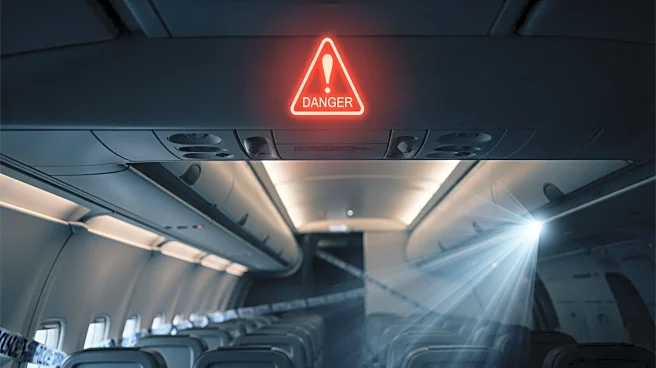What's Happening?
An Air China flight from Hangzhou to Seoul was forced to make an emergency landing in Shanghai after a lithium-ion battery in a passenger's carry-on bag ignited, causing flames and smoke to emanate from an overhead
bin. Flight attendants quickly implemented emergency fire procedures, using fire extinguishers to contain the blaze and instructing passengers to remain seated. The pilots declared an emergency and diverted the flight to Shanghai Pudong Airport, where the aircraft landed safely. Fire crews met the plane upon arrival, and passengers disembarked without injury. Air China arranged a replacement aircraft for travelers continuing to Seoul.
Why It's Important?
The incident highlights the ongoing risks associated with lithium-ion batteries on aircraft, which can spontaneously combust and pose significant safety hazards. Airlines have implemented various safety measures, such as fire containment bags and heat-resistant gloves, to manage such fires when they occur in the passenger cabin. However, fires in the cargo hold are more challenging to contain, underscoring the importance of regulations regarding the transport of electronic devices. The event serves as a reminder of the potential dangers of carrying lithium-ion batteries on flights and the need for continued vigilance and safety protocols.
What's Next?
Airlines may review and potentially update their safety protocols regarding the transport of lithium-ion batteries, especially in light of this incident. Regulatory bodies could also consider stricter guidelines for passengers carrying electronic devices with lithium-ion batteries. The aviation industry might explore further technological solutions to enhance fire safety measures on aircraft, ensuring passenger safety and minimizing risks associated with battery fires.
Beyond the Headlines
The incident raises questions about the balance between passenger convenience and safety in air travel. As electronic devices become increasingly integral to daily life, airlines and regulators must navigate the complexities of ensuring safety without overly restricting passengers' ability to carry necessary devices. This event could prompt discussions on the ethical considerations of passenger safety versus convenience, potentially influencing future policy decisions.









